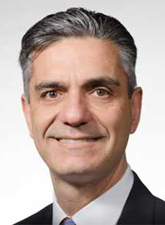Luiz Aragon, New Rochelle”™s former commissioner of development, believes other municipalities can learn a lot from the way the city”™s revitalization has unfolded and is thinking of establishing a national consulting operation that could, among other things, help them do that very thing.

Aragon retired at the end of 2020 after having capped his public service career with seven years in the New Rochelle development position. During his time as commissioner, 32 projects received site plan approval with about a third either completed or currently under construction. He will be a consultant to New Rochelle while a replacement is being recruited.
“One of the things I”™m looking at is starting a consulting firm. I”™ve been contacted by a number of people and that”™s probably the path that I”™ll follow,” Aragon told the Business Journal. “At a national level I”™ll be looking at municipalities outside of the tristate area that need some help. I”™m looking forward to helping as many municipalities and as many people as I can. I really like to implement change that has positive impact on peoples”™ lives and I want to continue to do that.
“I want to continue to help the Hudson Valley grow and hopefully help not only Westchester but the region and various municipalities within it accomplish that goal. The same formula is not going to be correct for every municipality but what we”™ve done in New Rochelle can be adjusted to the scale that is needed for each locality.”
Aragon said he anticipates there will continue to be growth in the New York metro region in the post-pandemic real estate world, especially in cities such as New Rochelle, Yonkers, White Plains and Mount Vernon.
“This past year forced us to take a step back and look at it differently and rethink the future of New Rochelle so an adjustment, a tuning if you will, of the plans moving forward was necessary,” Aragon said.
“As we move forward and we adapt to our new normal, there needs to be an understanding that people are going to live differently, understanding that people are not necessarily going to commute to work every day. This past year the pandemic has made us rethink the way we operate.”
Aragon said municipalities need to be redesigning and adjusting their downtown planning in order to accommodate future needs. He said that even with changes resulting from experiences during the pandemic the concept of transit-oriented development for cities will be very much alive.
“People are still going to need to go to and from locations; however, it”™s creating the ability for some of it to happen at a local level. Downtowns are still going to be very important because that”™s where you can provide that service so you can get out of the house and walk a few blocks to your office building, your satellite office, even though you may still have a main office in Manhattan,” Aragon said. “It”™s really looking at what the new normal is going to be.”
Aragon pointed to creating a downtown overlay zone as having been fundamental to reshaping New Rochelle”™s 300-acre business core. He said the tip of the downtown pyramid, literally and figuratively, is the planned 48-story building at 11 Lawton St., for which construction drawings were being prepared at the time of his retirement.
Aragon said that one of his takeaways from his time as development chief in New Rochelle has to do with interacting and communicating with the public.
“You don”™t go from an undeveloped area to all of a sudden these buildings are up. There is a period of construction that is very, very uncomfortable, where there is construction everywhere, where there is dust, there are holes in the ground, you can”™t really go from point A to point B,” Aragon said. “I would have spent more time explaining that to the community so it didn”™t come as a surprise. I think for me that”™s the big lesson learned.”
He said that other municipalities might learn from what”™s been happening in New Rochelle so that developers are more likely to invest in a city if the city makes it easy for them to do so by cutting red tape and making sure that policies don”™t present insurmountable obstacles.
Under Aragon”™s watch, developers approaching New Rochelle with development ideas were told that if they came in with plans that fit within the city”™s predetermined parameters their projects could be approved in as little as 60 to 90 days.
“If anybody is going to invest there is one thing they are looking for and that is certainty. We tried to provide as much certainty as we could and I give credit to the elected council and mayor and our city manager,” Aragon said, adding that the residents of New Rochelle as well as those in government can be proud of what was accomplished.
“We became a shining example to the nation as to how a municipality should grow, so I”™m very proud of the work that we have done,” Aragon said.




















